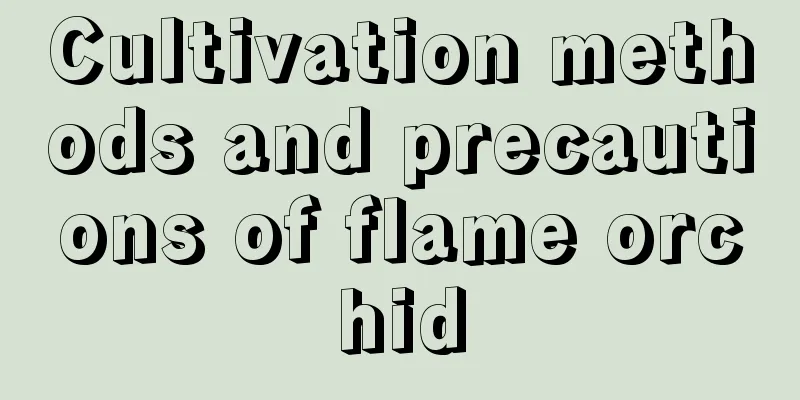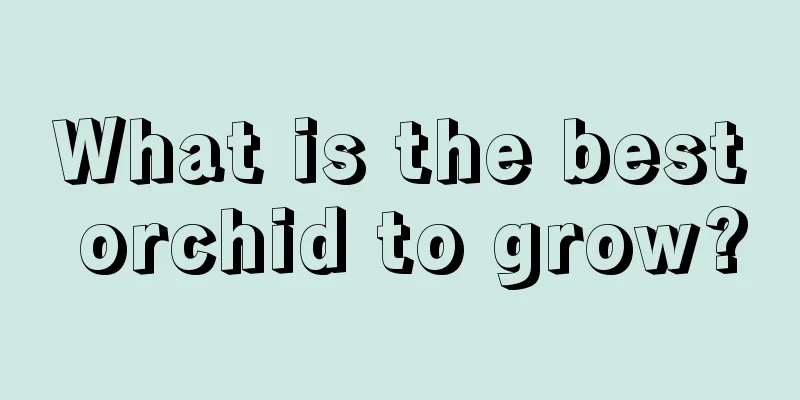Cultivation methods and precautions of flame orchid

1. Maintenance methods1. Temperature: Judging from the latitude of its distribution area, it prefers higher temperatures. Specifically, the most suitable range is between eighteen and thirty-five degrees. Its cold resistance is not very good, so it is generally not distributed in places with severe winters. If you need to maintain it, you need to pay attention to protecting it from the cold in winter. 2. Light: Flame orchid is a light-loving plant. Its growth and subsequent flowering cannot be separated from light. However, it should be noted that too strong light can also be harmful, such as causing leaves to turn yellow and fall off, and flowers to wither, so it is necessary to provide some shade at noon. 3. Watering: Flame orchid likes moisture. Especially when it is growing vigorously, it needs a lot of water. In addition to keeping the substrate moist, the air humidity range must be adjusted to between seventy and eighty percent. When it is too dry, spray water to adjust it. 4. Fertilization: Flame orchid requires more fertilizer. In addition to the general base fertilizer, fertilizer should be applied every half a month. Especially during the flowering period, phosphorus and potassium fertilizers are more critical. 2. Breeding techniques1. Reproduction: It can be propagated by division. It is mainly carried out in spring and autumn. You can choose the new shoots that grow after removing the top of the mother plant as materials. After cutting them with a knife, they can be planted. Overall, the operation method is relatively simple and the chance of success is relatively high. However, special attention should be paid to maintenance after planting to ensure the temperature and humidity. 2. Pruning: In spring, the main pruning task is topping, and the yellow and dry leaves also need to be cut off. Furthermore, it is best to cut off the remaining flowers in time after flowering. 3. Problem diagnosis and treatment1. Diseases: Overall, there are not too many diseases. In summer, the probability of occurrence is relatively higher. For example, "white rot" is prone to occur under high temperature and high humidity conditions. Lime can be used for prevention and control. In addition, drainage must be done properly. 2. Pests: The most commonly seen ones are "scale insects", which are more likely to appear when the humidity is high and can be controlled with pesticides. IV. Other issues1. Toxicity: Flame orchid is non-toxic and harmless. 2. Can it be raised at home? Yes, it has good ornamental value. However, this species is relatively rare and not very common. |
<<: Huang Qiuying's breeding methods and precautions
>>: Cultivation methods and precautions of ice berry
Recommend
Phalaenopsis cultivation methods and precautions
1. Soil 1. Phalaenopsis has relatively high requi...
Factors Affecting Peony Flowering
temperature Even in the same area, the temperatur...
This flower turns into a blooming machine in autumn. Buy it for 5 yuan and sell it for 20,000 yuan!
Shade and sun protection are essential Although t...
How to care for a well-growing tiger skin plant? Is tiger skin plant easy to grow?
1. How to maintain 1. Prepare the soil: If you wa...
How to solve the problem of yellowing leaves of lucky bamboo in winter
1. Increase lighting Reason: Lucky bamboo is usua...
When is the best time to grow sweet potato seedlings?
Yam, also known as sweet potato, sweet potato, an...
The efficacy and function of Daphne koreana
The ornamental effect of Daphne koreana Daphne ko...
How to propagate Lithops and what to pay attention to
Lithops reproduction method Lithops can be propag...
Hibiscus Pest Control
Hibiscus aphid Aphids are one of the most common ...
How long is the growth cycle of redwood?
Redwood growth cycle There are many varieties of ...
Top 10 famous brands of compound fertilizers in China (which brand of compound fertilizers has good quality)
What brand of compound fertilizer is good in Chin...
Growth conditions and characteristics of Sedum
Growing conditions of lichen Lignum moss is suita...
Perilla planting methods and techniques
Perilla is also known as Guiren, Chisu, Baisu, an...
How to prune Christmas cactus and how to pay attention to the pruning method and precautions
Christmas cactus pruning time Christmas cactus ca...
Will avocado trees in pots bear fruit? How to plant them to make them bear fruit?
1. Will it bear fruit? Potted avocados can bear f...









